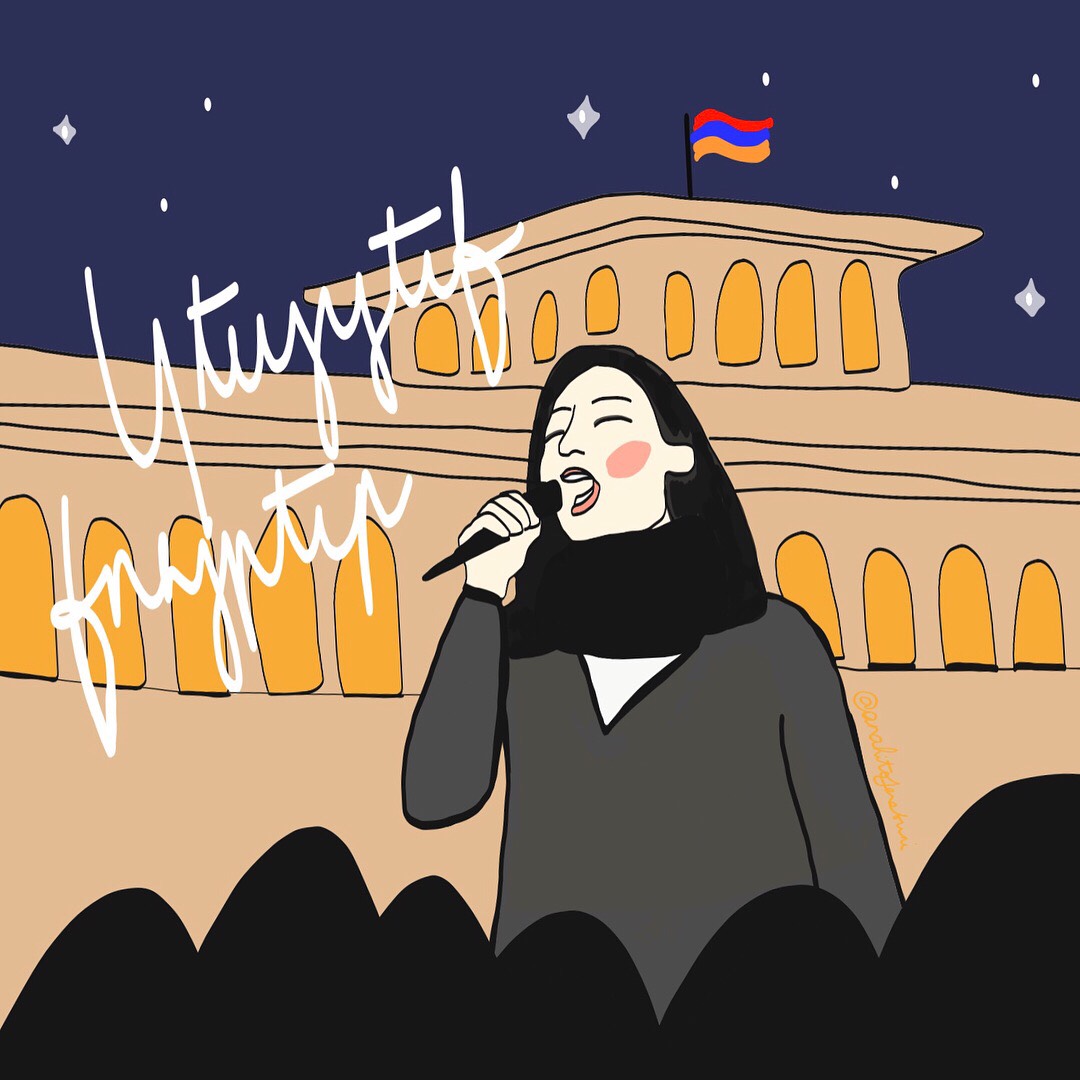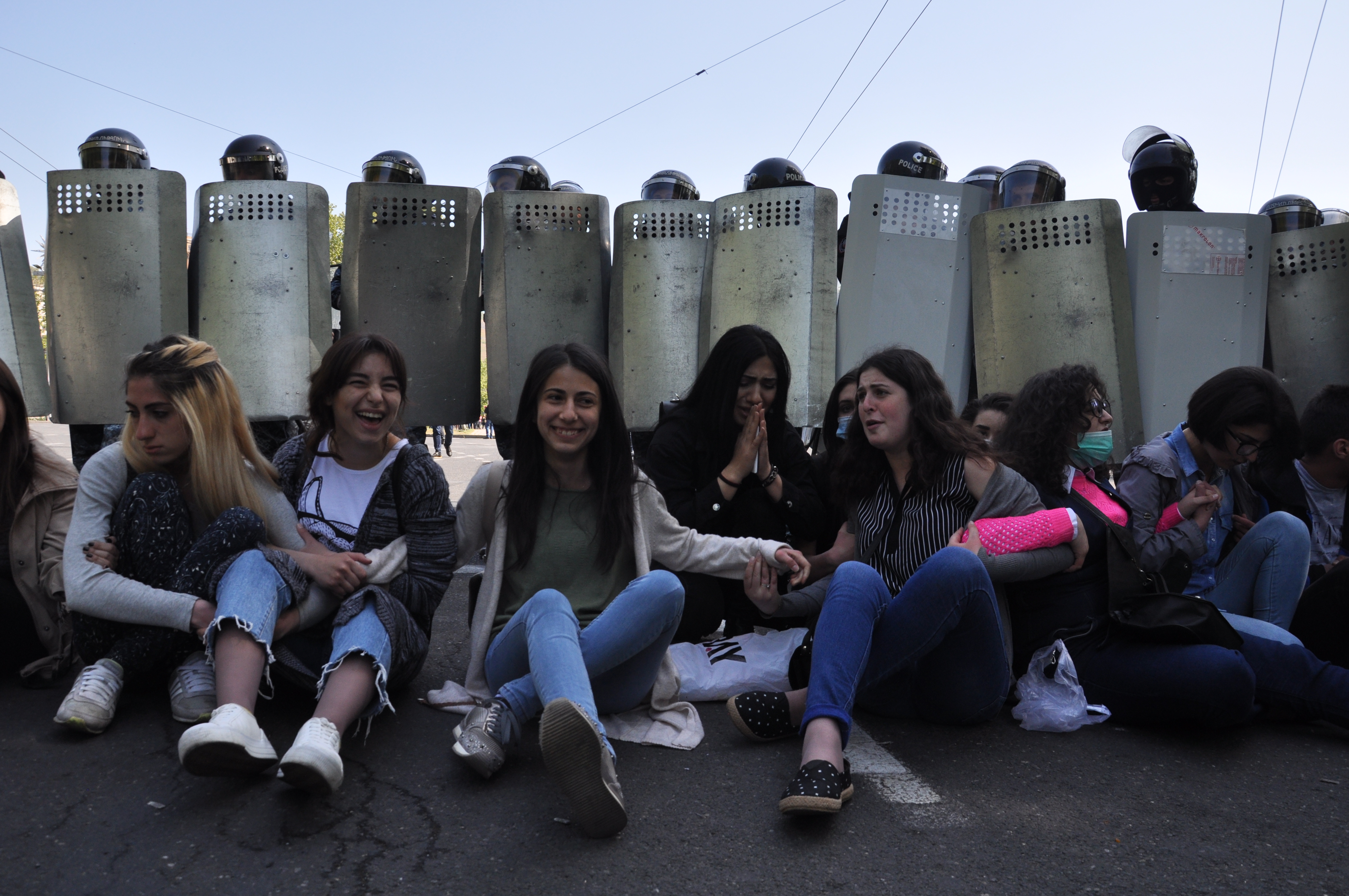

As more and more women choose to enter politics in revolutionary ‘New Armenia’, a debate is raging within the country’s feminist circles: how best to transform Armenia’s patriarchal systems — from within or without.
‘It was the methods of the Velvet Revolution, i.e. de-centralisation, horizontality, that allowed women to participate. You didn’t have to push women to take a political action — it happened naturally. Because the street was not hierarchic, if not anarchic.’ This is how feminist Maria Karapetyan, one of the organisers of the ‘Reject Serzh’ movement that toppled decades of Republican Party rule sums up the role of women in the revolution.
While many women and girls still get goosebumps from Karapetyan’s famous ‘Long live sisters’ speech in Yerevan’s Republic Square on 18 April, she has taken the decision — she says a hard one — to join the Civil Contract Party and run for parliament.
Karapetyan is not the only woman who thinks the Velvet Revolution must continue inside state institutions and local governments. The first post-revolutionary elections in the country, 23 September’s mayoral and council elections in Yerevan, saw swathes of women activists joining the My Step alliance backed by Prime Minister Nikol Pashinyan.
Winning a landslide victory of 81% of votes, My Step took 57 of 65 council seats, out of which 15 were women.
On 10 October, Diana Gasparyan won mayoral elections in Vagharshapat (Ejmiatsin), a city just west of Yerevan, becoming the country’s first woman mayor. Parliamentary elections due in December will see even more women as candidates.
This will bring feminisation in decision-making bodies of the country, but some have questioned whether it will bring more protection of women’s rights.
A certain subset of radical feminists in Armenia see working with the state as contradictory to the goals of feminism — women’s liberation. According to them, the state is the protector of private property and the family (property belongs to men, and family is the foremost place of women’s exploitation).
They argue instead that the fight for the women as a ‘sex class’ must come via empowering women’s communities, creating cooperative models of social relations, and not via individual success stories of girls who managed to break the glass ceiling.
Patriarchs with a human face
The New Prime Minister Nikol Pashinyan has been articulate on his views on gender equality. Emphasising women’s role in his speech on 8 May, the day he was appointed, Pashinyan said that ‘women’s massive participation is a factor that allowed us to call what happened a revolution of “Love and solidarity” ’.

But then he added something that made feminists throughout the country wince. ‘The revolution proved that women’s active participation [in politics] is compatible with our national identity, our national perception of the family’.
Most feminists concede that the new government is not quite educated on what the women’s movements are about. But many have been forgiving, at least for now, in the belief that combating the risk of counter-revolution is a priority.
‘In pre-revolutionary times, we had to break in to participate, for example, in a discussion of the domestic violence law in the Ministry of Justice’, says Lara Aharonyan, co-founder of Women’s Resource Centre in Yerevan.
‘Yes — members of the new government are products of the same patriarchal society. They are patriarchal people, too. The difference is, they are ready to listen, to educate themselves, to collaborate with civil society, unlike their predecessors’.
Aharonyan thinks for women to participate, the state must first make certain steps forward. One such step, she says, would be raising electoral gender quotas to improve the disproportionate gender balance in parliament. In the current parliament, which was dissolved on 1 November, just 18% of MPs were women.
‘Women have to be present to talk about their needs. And if more than half of the population are women, for justice and for equal representation, women should make up 50% of parliament’, Aharonyan argues.
Trading in activism for party politics

As a long-time party member of the Armenian Revolutionary Federation, Sevan Petrosyan agrees that the party system is a compromise for staunch feminists.
‘As Simone de Beauvoir said as a woman in the French Communist Party, she had to fight on two fronts; within the party and outside of it. That’s the only solution. I had no illusions that this revolution would bring women to politics with full force. It was not the priority. Unlike many other feminists, I was not disappointed when Pashinyan appointed only two women as ministers in his cabinet, because I didn’t have high expectations in the first place.’
‘My problem was that this was not a movement of the poor. It was a movement to get rid of the Republican Party, of corruption, a lack of transparency — that was it. Yes, the state came closer to me, I can write a quick question to my friend, who is now a deputy minister. But the state hasn’t come closer to a villager from provinces’, says Petrosyan.
Long before the Velvet Revolution, a key ally of Pashinyan’s, Lena Nazaryan, was one of the first woman to trade in activism for party politics. As an outspoken environmental activist and critical journalist for many years, Nazaryan was one of the co-founders of Pashinyan’s Civil Contract Party back in 2015.
Nazaryan has now climbed the party-political ladder to head the Way Out faction in Parliament. As a role model to many young women, she is often harried for selfies by teenage girls.
‘I don’t like it when women are presented as weak, as if they need to be pushed to be active. No, they should be present because women are needed. And when they are, they should prove it in their work’, says Nazaryan.
‘I personally prefer collaborating with women, if I have the choice, because women are better team-players, they are interested in getting the work done, not in competing’.
Transforming social relations, not individual women
Most radical feminists in Armenia who refuse to compromise with the state do so without condemning other women’s decisions to do so.
‘I don’t say women should not engage in politics, I’m saying their participation should not be the end in and of itself’, says feminist activist Anna Shahnazaryan.
‘If a woman enters parliament, she should question the way decisions are made there. If a woman enters an institution to dismantle it from within, to make the institution more democratic and human-centred, I encourage that’.
‘Personally I don’t care whether the mayor of Ejmiatsin is a woman if she doesn’t represent her gender […] The minister of work and social affairs is a woman, Mane Tandilyan, but for me its a problem that she doesn’t speak up about women doing unpaid work as housewives.’
Shahnazaryan and her colleague Arpine Galfayan have been involved in activism on many fronts, including helping to set up collective resistance movements in communities to fight mining projects such as in Teghut, Amulsar.
Galfayan warns against falling into the ‘trap’ of being used as token women in politics.
‘Women are being used to fill quotas, to give false hope that it’s getting better’, she says.
‘I believe that institutions of representative democracy have the logic of keeping full control and not sharing power with others’, Galfayan argues.

She says that globally, the system is ‘promoting the interests of the wealthiest and most inhumane corporate elites. It is ultimately hierarchical; men (especially wealthy heterosexual men), have had privileged positions in these hierarchies for ages, and therefore women have a very hard time becoming part of the “club”. Finally, even those few women who do get to the top still have to serve the interests of this hierarchical, unfair system.’
‘I prefer to work towards dismantling this system rather than making it look nicer. I prefer to support and strengthen systems which I believe are ultimately fair and liberating’, Galfayan says.
Shahnazaryan claims the important thing to ask is whether a woman is aware of the subordination she faces because of her gender.
‘To be political a woman doesn’t have to be in parliament. If a housewife protects her female neighbour, interfering and preventing domestic violence, she is taking a political action.’
Dismantling the patriarchy from all sides
However, most feminists in Armenia agree that there is no dichotomy to ‘be reformer or a radical feminist’, and that change has always come with both forces in action together. They point to the Suffragettes movement in early 19th century Britain, in which militant women’s movements worked in parallel with conservative feminist groups.
Few politically active women in Armenia would disagree that the revolution should be continued, and that the famous feminist slogan — personal is political — still rings true. Some focus on ‘the personal’ of the phrase; working hard on themselves to win in an unequal battle with privileged men, while fight to transform the existing social relations.









